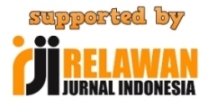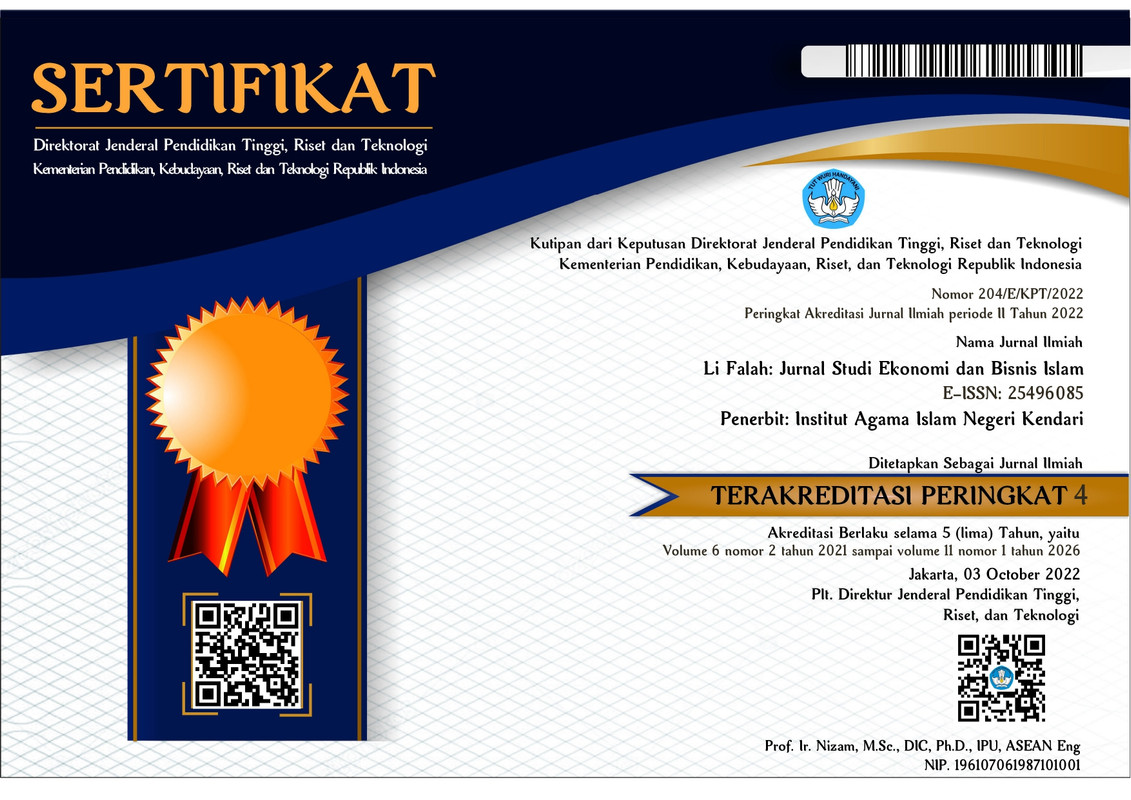Social Justice and Poverty: Islamic Economic Perspective
Abstract
This paper aims to describe the socio-economic justice concept taught by Islam, which wants a proportional income distribution. It can also be said that the Islamic economy is an economy based on togetherness. Therefore, it is not strange if the assumption of the Islamic socio-economic justice principle is similar to the socialist system. There has even been an opinion stating that if the socialist system is added and incorporated Islamic elements into it, it will become Islamic. I conducted a literature study and a descriptive analysis approach to the literature and existing sources. Some perspectives and opinions stated that the similarity of the socio-Islamic justice system with socialism was not entirely true; there were more mistakes. The economic principle of socialism, which rejects individual ownership and wants an even income distribution, differs from Islamic economic principles. Islamic economics, the enforcement of socio-economic justice, is based on a sense of brotherhood (ukhuwah), mutual love (mahabah), shoulder to shoulder (takaful), and mutual help (ta'awun), both between the rich and the poor and between the rulers and the people.
Keywords
Full Text:
PDFReferences
Abdurrachman, A. 1991. Ensiklopedia ekonomi, Keuangan, dan perdagangan: Inggris-Indonesia. Jakarta: Pradnya Paramita.
Abu Hamid al-Ghazali. 2008. إحياء علوم الدين.
Afzal-ur-Rahman. 1988. Islam Ideology and the Way of Life. London: Seerah Foundation London.
Ahamed Kameel Mydin Meera. 2004. The Theft of Nations: Returning to Gold. Subang Jaya, Selangor Darul Ehsan, Malaysia: Pelanduk Publications.
Ahmad, Mushtaq. 2001. Etika bisnis dalam Islam. Jakarta: Pustaka Al-Kautsar.
Aprianto, Naerul Edwin Kiky. 2018. “KEMISKINAN DALAM PERSPEKTIF EKONOMI POLITIK ISLAM.” ISLAMICONOMIC: Jurnal Ekonomi Islam 8(2). http://journal.islamiconomic.or.id/index.php/ijei/article/view/60 (October 16, 2020).
Chapra, M.U. 2000. Islam Dan Tantangan Ekonomi. Gema Insani Press. https://books.google.co.id/books?id=rhjIRzJvwpgC.
Crone, Patricia, and Michael Cook. 1980. Hagarism: The Making of the Islamic World. 1. paperback ed. Cambridge: Cambridge Univ. Press.
Huda, N. 2017. Ekonomi Pembangunan Islam. Prenada Media. https://books.google.co.id/books?id=hcSZDwAAQBAJ.
Ibn Khaldūn, Franz Rosenthal, N. J. Dawood, and Bruce B. Lawrence. 2005. The Muqaddimah: An Introduction to History. 1st Princeton classic ed. / with a new introduction by Bruce B. Lawrence. Princeton, NJ: Princeton University Press.
Khadduri, Majid. 1984. The Islamic Conception of Justice. Baltimore: Johns Hopkins Univ. Press.
Meirison, Meirison. 2018. “Riba and Justification in Practice in Scholars’ Views.” TRANSFORMATIF 2(1): 348.
———. 2019a. “Legal Drafting in the Ottoman Period.” Jurnal Ilmiah Al-Syir’ah 17(1): 39.
———. 2019b. “Mashlahah Dan Penerapannya Dalam Siyasah as Syar’iyah.” Ijtihad 32(1). http://journal.fs.uinib.ac.id/index.php/ijtihad/article/view/32 (September 5, 2020).
Noor, Ruslan Abdul Ghofur. 2014. “Kebijakan Distribusi Ekonomi Islam Dalam Membangun Keadilan Ekonomi Indonesia.” ISLAMICA: Jurnal Studi Keislaman 6(2): 316.
Qaradawi, Yusuf, Salmah Harun, Didin Hafidhuddin, and Hasanuddin. 2007. Hukum Zakat: Studi Komparatif Mengenai Status Dan Filsafat Zakat Berdasarkan Quran Dan Hadis. Bogor, Jakarta: Litera Antar Nusa.
Raḥmān, Fazlur, and John E. Woods. 2002. Islam. 2. ed. Chicago: Univ. of Chicago Press.
Rahmiyanti, Desi. 2018. “Implementasi Keadilan Dalam Pembangunan Ekonomi Islam.” Al-Buhuts 14(02): 53–68.
Sakni, Ahmad Soleh. “KONSEP EKONOMI ISLAM DALAM MENGENTASKAN KESENJANGAN.” : 8.
Sali, Meirison Alizar. 2019. “Distinction of Justice and Fairness during Umar Bin Abdul Aziz�s Reign.” AJIS: Academic Journal of Islamic Studies 4(2): 127.
Sekolah Tinggi Agama Islam Negeri (STAIN) Bengkulu, and Asnaini. 2008. Zakat Produktif Dalam Perspektif Hukum Islam. Pustaka Pelajar. https://books.google.co.id/books?id=yPMqPAAACAAJ.
Shihab, M. Quraish, and M. Quraish Shihab. 2012. Surah ash-Shaff, Surah al-Jumuʿah, Surah al-Munâfiqûn, Surah at-Taghâbûn, Surah ath-Thalâq, Surah at-Tahrîm, Surah al-Mulk, Surah al-Qalam, Surah al-H̱âqqah, Surah al-Maʿârij, Surah Nûẖ, Surah al-Jinn, Surah al-Muzzammil, Surah al-Muddatstir, Surah al-Qiyâmah, Surah al-Insân, Surah al-Mursalât. Cetakan V. Jakarta: Lentera Haiti.
Zuḥailī, Wahba az-. 2002. al-Fiqh al-islāmī wa-adillatuhū: aš-šāmil li-ʾl-adilla aš-šarʿīya wa-ʾl-ārā al-maḏhabīya wa-ahamm an-naẓarīyāt al-fiqhīya wa-taḥqīq al-aḥādīṯ an-nabawīya wa-taḫrīǧihā mulḥaqan bihī fahrasa alfābāʾīya šāmila li-ʾl-mauḍūʿāt wa-ʾl-masāʾil al-fiqhīya. Ǧuzʾ 11: al-Fahāris al-ʿāmma: fahrasa alfabāʾȳia šāmila li-ʾl-āyāt wa-ʾl-aḥādīṯ wa-ʾl-mauḍūʿāt al-fiqhīya. Nachdr. der vierten verb. Ausg. Dimašq Bairūt: Dār al-fikr.
البخاري ، محمد بن اسماعيل. 2011. الأدب المفرد. بيروت: دار الكتب العلمية،.
ترمذي، محمد بن عيسى, and Mirzo Kenzhabek. 2013. Sunani Termiziĭ: al-zhomiʺ as-saḣiḣ : ḣadislar tŭplami tarzhimasi = Sunan al-Tirmidhī.
DOI: http://dx.doi.org/10.31332/lifalah.v7i1.2225
Copyright (c) 2022 Meirison, Tuti Unani, Kasmidin

This work is licensed under a Creative Commons Attribution-ShareAlike 4.0 International License.
Li Falah : Jurnal Studi Ekonomi dan Bisnis Islam, Indexed In
Accredited By
View My Stats
Organized by : Fakultas Ekonomi dan Bisnis Islam
Published by : Institut Agama Islam Negeri Kendari
Jl. Sultan Qaimuddin No. 17 Baruga Kota Kendari Provinsi Sulawesi Tenggara
phone. +62401-3193710
Fax. +62401-3193710
Email: lifalah.iainkdi@gmail.com



















